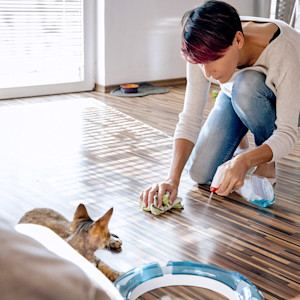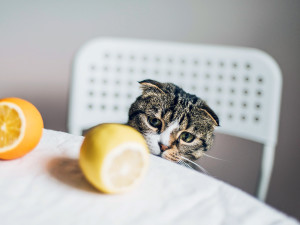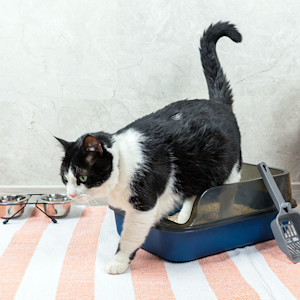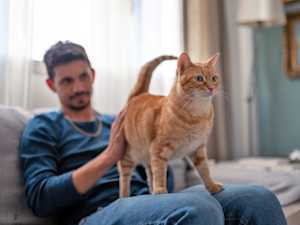Why Do Cats Sniff Butts?
Hey, there, dude—isn’t that a little personal?

Share Article
In This Article:
Cat’s Sense of Smellopens in a new tab How Do Cats Use Scent to Communicate?opens in a new tab Why Do Cats Sniff Each Other’s Buttsopens in a new tab ?opens in a new tab Frequently Asked Questionsopens in a new tab
Ah, the butt sniff — a vital communication tool for cats. A repulsive invasion of personal space to humans. What on earth drives a cat to get up close and personal with the business end of another cat? A number of things, actually, based primarily in scent. And they’re all quite civilized, in spite of what we bipeds may think.

littleKin™ is Kinship’s home just for puppy and kitten parents. Bop over to check out expert advice, new pet tools, and special deals—all curated for your newest family member.
opens in a new tabCats’ sense of smell
If communication is key, scent is whereopens in a new tab it all starts for cats. We know how well they use body languageopens in a new tab. But scent may be even more informative, as they try to learn about other cats and interpret the environment and situations they find themselves in.
It’s not just scent, as in smelling another cat’s urine and thinking, Hey, there was another cat here. I can smell it. They’re also picking up on pheromones. Between basic smells and the chemical signals from pheromones, one cat can gather an astounding amount of information about another.
Scent provides:
Identification as a known cat or stranger
Sexual signals, such as a female in heatopens in a new tab
Bonding cues, such as those from cats who have chosen to live in a social group and share a group scent, or a mother cat inducing bonding between kittens
Territory marking
Fear and anxiety signalsopens in a new tab indicating potential danger
They also use scent for their own emotional supportopens in a new tab. Cats feel comforted when surrounded by their own scent, which is why it’s common for them to pee or spray around their environment during times of stress or fear. They mix their scent with ours as a form of self-soothing, leading to peeing opens in a new tab or spraying thingsopens in a new tab that are heavy with our scent, like beds and couches. This happens often when people travel and their cats are left at home.
How do cats use scent to communicate?
Is a cat’s nose really powerful enough to do all of that? I mean sure, their sense of smell is stronger than ours — about 14 times stronger, in fact. But is that enough? Yes and no. They’re not just relying on their noses. They have another scent-gathering tool called the vomeronasal organ, or Jacobson’s organ, located above the roof of the mouth. And they’re covered in scent glands, from head to tail.
Jacobson’s organ
The Jacobson’s organ is in play when your cat opens their mouth slightly and makes a wild face, with the lips curled up, as if they’re about to sneeze. This is called the Flehman responseopens in a new tab. They’re taking in chemical stimuli — pheromones. These chemical signals make a complex journey through the Jacobson’s organ to the accessory olfactory bulb in the brain. And that’s where your cat’s instincts are triggered, depending on what those signals, well, signal.
Here's a fun fact: Many animals have a Jacobson’s organ. It’s thought that we humans once had functional Jacobson’s organs as well. There’s evidence it may have existed but was lost at some point during our evolution.
Cats’ active scent glands
How are cats producing all these scents and pheromones? They’ve got scent glands all over the place. The cheeks, chin, and forehead scent glands are often referred to as the place for “happy” pheromones. These are the spots they rub on youopens in a new tab, your other cats, the furniture, and anything else they want to bond with or mark.
Not to be left out, the ears also have scent glands and get rubbed on all the things cats want to stink up with their scent. They also have scent glands in their paws. This is one of the many reasons scratching is so importantopens in a new tab. It deposits their scent, helping them communicate their presence to other cats and self-soothe. Even cats without claws still go through the motions of scratching, in part to scent mark.
The tail, and everyone’s favorite place to scratch a cat — the base of the tail — are also full of scent glands. And that brings us to the main event — the primary reason cats sniff each other’s back ends.
Cats’ anal glands
Cats have two tiny sacs on either side of the rectum. They’re not usually visible from the outside. These glands produce fluid with a strong scent. It’s all about pheromones. The only time we’re really exposed to that scent is when a cat sprays. During this natural behavior, secretions from the anal glands mix with urine. Otherwise, it’s expelled when your cat poops.
Why do cats sniff each other’s butts?
Whether those anal gland pheromones are inside the body, on the surface of your cat’s back end, or in their poop or spray, they’re of interest to other cats. Hence, the sniffing of butts. Don’t forget the scent glands on the tail and at the base of the tail. Those are in butt proximity too. And they’re all sharing information.
Next time your cat does the butt sniff, they may be trying to:
Introduce or reintroduce themselves
Cats don’t just say hello once as a greeting. When they’re sharing space, there’s a lot of rubbing, sniffing, and booping to identify each other and reinforce their bonds.
Get information about another cat
We’ve talked about the incredible amount of information cats gather about each other just through scent. And this concept still hasn’t been fully studied. I think we’ll continue to learn more fascinating facts about how cats communicate with each other through scent.
Find a mate
The booty sniff is like a post on a dating site for cats, as those pheromones and hormones opens in a new tabare delivering information about sexual status.
Establish dominance
This one I’m on the fence about. There’s still so much we don’t understand about cat social hierarchy. Many have moved away from the idea that one cat wants to establish dominance or act as the “alpha” in a social group. They may want to be top of the ranks one minute and happy to roll over or get the heck out of another cat’s way the next minute. But it’s possible that this sniffing could be a social cue we haven’t fully figured out yet.
Should you stop your cats from sniffing each other’s butts?
As long as the cats involved seem calm and relaxed, there’s no reason to interrupt this behavior. It’s completely natural. In fact, it could be stressful for the cats if they aren’t able to communicate in the way that feels most instinctual in that moment.
On the other hand, I often see one cat who’s really intense and insistent about sniffing the back end of another more fearful, nervous cat. In that case, you may want to step in because it’s causing increased stress. And that can lead to tension between the cats that could damage their relationship.
I see this most often during introductionsopens in a new tab, where the cats don’t know each other well yet. One is overly excited to say hello while the other is still cautious. It can also happen with a younger, more energetic cat insistently sniffing an older cat who’s just not in the mood.
Don’t ever punish your cat for this, or any, behavior. Just gently redirect them away from the cat they’re sniffing, wait a minute, then give them something else to focus on for a couple of minutes. You can also encourage other forms of scent sharing, like sleeping in the same spots and playing with the same toys. And you can encourage positive group activities, like play and treat sessions, as another form of bonding.
FAQs
Should I let my cat sniff other cats’ butts?
As long as neither cat seems stressed by it or aggressive about it, it’s perfectly natural for your cats to sniff each other’s butts. Let them do their thing.
Can cats communicate through scent?
Cats can absolutely communicate through scent. In fact, it’s one of their primary communication tools. They can learn a ton of information about each other just by doing a little sniffing.
Is a cat’s sense of smell stronger than a human’s?
A cat’s sense of smell is estimated to be about 14 times stronger than a human. In fact, it’s thought that they can pick up a scent as far as three or four miles away, in some cases.
What if my cat seems obsessed with their own butt?
If your cat is constantly licking or paying attention to their own back end, especially if it’s difficult to distract them, it’s time to see your vet. There are medical reasons your cat may be focused on this area, like anal gland issuesopens in a new tab or physical discomfort.
References
Cats.com, and Lizzie Youens MRCVS BSc (Hons) BVSc. “What Are Cat Pheromones and Do They Really Work?” Cats.com, 5 Aug. 2022, cats.com/cat-pheromonesopens in a new tab.
“Cat Spraying: Why Cats Do It and How to Stop It.” Www.petmd.com, www.petmd.com/cat/general-health/cat-spraying-why-cats-do-it-and-how-to-stop-itopens in a new tab.
Conny. “Anatomy of the Jacobson’s (Vomeronasal) Organ.” The Cat Edition, 25 Apr. 2024, thecatedition.com/cat-health/anatomy/anatomy-of-the-jacobsons-vomeronasal-organ/opens in a new tab. Accessed 5 Feb. 2025.
“Jacobsons Organ in Humans?” Www.thenakedscientists.com, 10 July 2007, www.thenakedscientists.com/articles/questions/jacobsons-organ-humansopens in a new tab.
Lovejoy, Jamie. “Anal Glands in Cats: What Are They, and How Do They Work?” Petmd.com, PetMD, 25 June 2024, www.petmd.com/cat/general-health/anal-glands-in-catsopens in a new tab. Accessed 5 Feb. 2025.
Piedad, Kristine . “Feline Olfaction and the Extraordinary Superpower of Cat Smell.” Felidae Conservation Fund, 22 Jan. 2024, felidaefund.org/news/general/feline-olfaction-and-the-extraordinary-superpower-of-cat-smellopens in a new tab.

LeeAnna Buis, CFTBS, FFCP
LeeAnna Buis has adored cats her entire life and thought she knew them inside-out and sideways. But it wasn’t until she worked with a feline behavior consultant that she fully understood how incredible, complicated, and inspiring cats really are.
LeeAnna earned her certification through Animal Behavior Institute, earning the CFTBS designation. She is a certified Fear Free trainer, a training professional member of the Pet Professional Guild (PPG), and a member of both the International Association of Animal Behavior Consultants (IAABC) and Cat Writer’s Association (CWA).
Related articles
![Cat leaving it's litter box at home.]() opens in a new tab
opens in a new tabWhy Does My Cat’s Pee Smell So Bad? Cat-Urine Odor Explained
Cat pee already has an unpleasant odor. But if it gets worse, you’re going to need to do something about it.
![Cat making a disgusted face.]() opens in a new tab
opens in a new tabWhat Smells Do Cats Like and Dislike?
Yes, cats have a powerful sense of smell.
![Man looking at his orange cat while it turns it's back to him.]() opens in a new tab
opens in a new tabWhy Do My Cat’s Anal Glands Smell?
No, it’s not normal. Here’s what it means, and what you should do.
- opens in a new tab
Can Cats Find Their Way Home?
Thankfully, their natural instincts serve them well.
![Woman playing with her orange cat.]() opens in a new tab
opens in a new tabWhy Does My Cat’s Breath Smell?
Oof, that is bad.
![a tattooed person with curly red hair on a couch pets a brown and black cat]() opens in a new tab
opens in a new tabYour Cat Can Tell When You’re Stressed, Study Says
It’s all in their noses.







